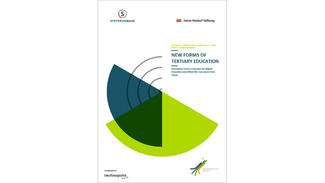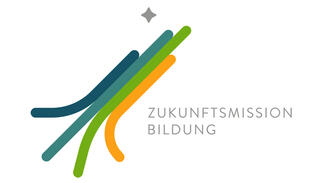
Exploratory study: New forms of tertiary education
Innovative Future Concepts for Higher Education
and What We Can Learn from Them
As part of the co-creative Vision Track of the Future Mission for Education, the Stifterverband and the Heinz Nixdorf Foundation publishes in August 2024 an exploratory study on innovative future concepts in the global education context and their transfer potential for German universities.
PDF download

Against the backdrop of rapid technological change, demographic developments and global polycrises, familiar challenges in the organisation of higher education are taking on a new urgency. It cannot be assumed that the social transformation in the production and dissemination of knowledge will stop at universities. Universities will have to change to remain centres of education, research and innovation.
In the context of the "Zukunftsmission Bildung" (Future Mission for Education), the Stifterverband and the Heinz Nixdorf Foundation therefore commissioned an international exploratory study to map future-viable concepts at German and international pioneering institutions and analyse their transfer potential.
The aim of the exploratory study is to provide inspiration, to enable learning from models and to open opportunities and room for discussion.
The future concepts outlined in the exploration study show promising approaches to solutions that address the following systemic challenges ("pain points") in the design of studies and teaching:
- Insufficient access and integration of underrepresented student groups
- Lack of dynamism in adapting teaching and learning content to new skills requirements
- Lack of innovation in the design of learning experiences
- Insufficient structural and institutional agility
The study was supported by a committed university community, implemented by the Technopolis Group from October 2023 to June 2024 and accompanied by a study advisory board of university experts.
Almost 170 global innovation examples were compiled using a crowd-sourcing approach. From these, seven case studies were selected to identify levers for change for the future-proof design of higher education and to discuss their effectiveness and transferability to the German higher education system.
The exploratory study thus systematically picks up on existing debates and discusses innovative approaches in terms of their effectiveness and transferability to the German higher education system based on the summarised challenges. The practical examples include both proven and promising new approaches. They focus primarily on the potential for adaptation in existing institutions, but also provide inspiration for new foundations. Finally, recommendations for universities and higher education policy are derived on this basis.
Executive Summary
- The innovative strength across the board of the German higher education system, which is required to overcome current and future challenges, is too low. The German higher education system can learn from sustainable models in Germany and abroad. The case studies analysed in this exploratory study show different levers for change in order to overcome four selected systemic challenges, which are not only "painful" for universities, but also for society if they are not solved.
- The reorganisation of the initial study phase and recognition practice represents a lever for change for a heterogeneous student body: Approaches in which universities focus less on formal qualifications and more on individual competences promote access to higher education for non-traditional students and their academic success, for example through innovative admission procedures (gamified tests such as at 42 Heilbronn) or the recognition of informally acquired competences through portfolios and interviews (College Unbound).
- The establishment of microcredentials – in collaboration with partners from education, business and society – can be an effective lever for dynamically adapting teaching and learning content to new skills requirements (see European Consortium of Innovative Universities (ECIU)). Degrees in the form of micro- and nanodegrees also create an opportunity to lower access barriers and diversify study programmes.
- The use of learning analytics and adaptive learning systems (see Arizona State University) as a strategic tool can help universities increase access and learning success for a diverse student body and enable personalised, flexible learning pathways.
- New network and organisational structures can act as a lever for change in order to promote educational and teaching innovations at universities in a more agile and sustainable way. Promising model approaches include interlinked, inter- and transdisciplinary innovation units in the areas of course development, research and learning infrastructure (see Arizona State University) or organisation in departments (see IT:U or UTN).
Study advisory board
A six-member study advisory board, consisting of experts from university practice, accompanied the entire study process and helped steer the direction of the study as well as the interpretation, validation and processing of (interim) results and conclusions.
- Manuel Dolderer, Co-Founder der Code University
- Philipp Hoellermann, Chief Transformation Officer (CTO) bei Deutsche Weiterbildungsgesellschaft
- Wibke Matthes, geschäftsführende Mitarbeiterin des Zentrums für Schlüsselqualifikationen,
Christian-Albrechts-Universität zu Kiel - Dr. Dominic Orr, Senior Advisor, Deutsche Gesellschaft für Internationale Zusammenarbeit (GIZ)
- Prof. Dr. Tobias Seidl, Professur für Schlüssel- und Selbstkompetenzen, Innovationsprofessur Lehre, Hochschule der Medien Stuttgart
- Prof. Dr.-Ing. Susanne Staude, Präsidentin der Hochschule Ruhr West

The exploration study is part of the Vision Track of the Future Mission for Education (Zukunftsmission Bildung) which bundles measures with a co-creative and explorative approach to strengthen the future viability of universities.
Zukunftsmission Bildung's website
(available in German only)

Diese Seite ist auch in
deutscher Sprache verfügbar
Contact

Dr. Yasmin Djabarian
is programme manager at Stifterverband.
T 030 322982-309